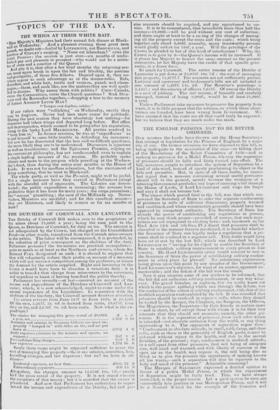THE DUTCHIES OF CORNWALL AND LANCASTER.
THE Dutch), of Cornwall Bill makes over to the proprietors of tin mines about 19,000/, a year ; being the sum paid to the Queen, as Dutchess of Cornwall, for duty on tin. The amount is not relinquished by the Crown, but charged on the Consolidated Fund—in other words, transferred from the Cornish mine-owners to the public. The latter will be recompensed, it is pretended, by the reduction of price consequent on the abolition of the duty. Fallacious pretence! the tin-miners are practical monopolists— quite as much so at least as the Northern coal-owners, whom Sir ROBERT PEEL designated as such : it is absurd to suppose that they will voluntarily reduce their profits on account of a measure which will not increase competition among the producers, or lessen the demand for the article supplied. Right and becoming in the Crown it would have been to abandon a vexatious duty : it is unfair to transfer that charge from mine-owers to the consumer, and impudent to boast of having benefited the public thereby.
Parliament has recently—at last—received an account of the income and expenditure of the Dutehies of Cornwall and Lan- caster; which, it is now acknowledged, ought to come under the annual cognizance of the Legislature. Iii connexion with the abolition of the tin-duty, the Cornwall account deserves attention. The entire revenue from June 1837 to June 1838, is 2s.456/. Of his sum, 5,5671. 3.s. 6t/. is derived from rents, 19,679/. from duty on tin, and 2,630/. Os. 5d. from coals. Now what is the ex- penditure?
The salaries for managing this gross rental of 28,000/
a year, are s. d. :04.2 0 10
Annuities and salaries to Stannary Officers are most im- i Properly " lumped in" with tithes on tin, and awe put
.1892 4 6
£683 12 6
490 13 8 Altogether, the charges amount to 12,670/. 19*. Id.— nearly ball the gross rental of the property. It is not stated who are the recipients of this money ; but it is manifest that the owner is plundered. And now that Parliament has undertaken to super- intend the income and expenditure of the Dutchy, full and Ire-
down at
Audit expenses (dinners to the tenants and agents, we toppose,) 332 S 0 Fees and travelling charges 933 7 8 Law expenses 1,784 16 6 Surely these items might be supposed sufficient to cover the cost of managing this property—there are salaries, annuities, fees, travelling charges, and law expenses : but no ! we have in ad- dition—
Incidental expenses, no less than Extraordinary payment else accounts should be required, and pay apportioned to ser- vice. It is to be remembered, that henceforth more than halt' the incomer-19,000/.—will be paid without any cost of collection; and there ought at least to be a saving of the charges of manag- ing all the property except the rents and the coals ; which being together only about 8,000/. annually, many trustworthy persons
would gladly collect for 100/. a year. Vill the privileges of the Crown be pleaded in bar of this kind of interference ? Why, the Crown is to gain by it—the Queen's income will be increased. If it please her Majesty to bestow the same amount on the present sinecurists, let her Majesty have the credit of that specific gene- rosity, in a direct form.
So much for Cornwall. The entire income of the Dutchy of Lancaster is put down at 23,0381. 10s. 7d.: the cost of managing this property, 11,8771.! The accounts are not sufficiently precise. Lawyers' and surveyors and tradesmen's bills are all included in one amount of 1,407/. 13s, 2d. The Receiver's poundage is 1.145?.; and the salaries of officers 7,651/. Of course the Dutchy is a nest of jobbing. The net income, if honestly and carefully managed, instead of being 9,000/., would be at least 21,000/. a year.
Unless Parliament take measures to preserve the property from waste, it is to little purpose that the returns, on which these obser- vations are founded, have been wrung from G ivernruent. We have assumed that the rents arc all that could fairly be expected ; but we believe that they are much under the mark.


























 Previous page
Previous page